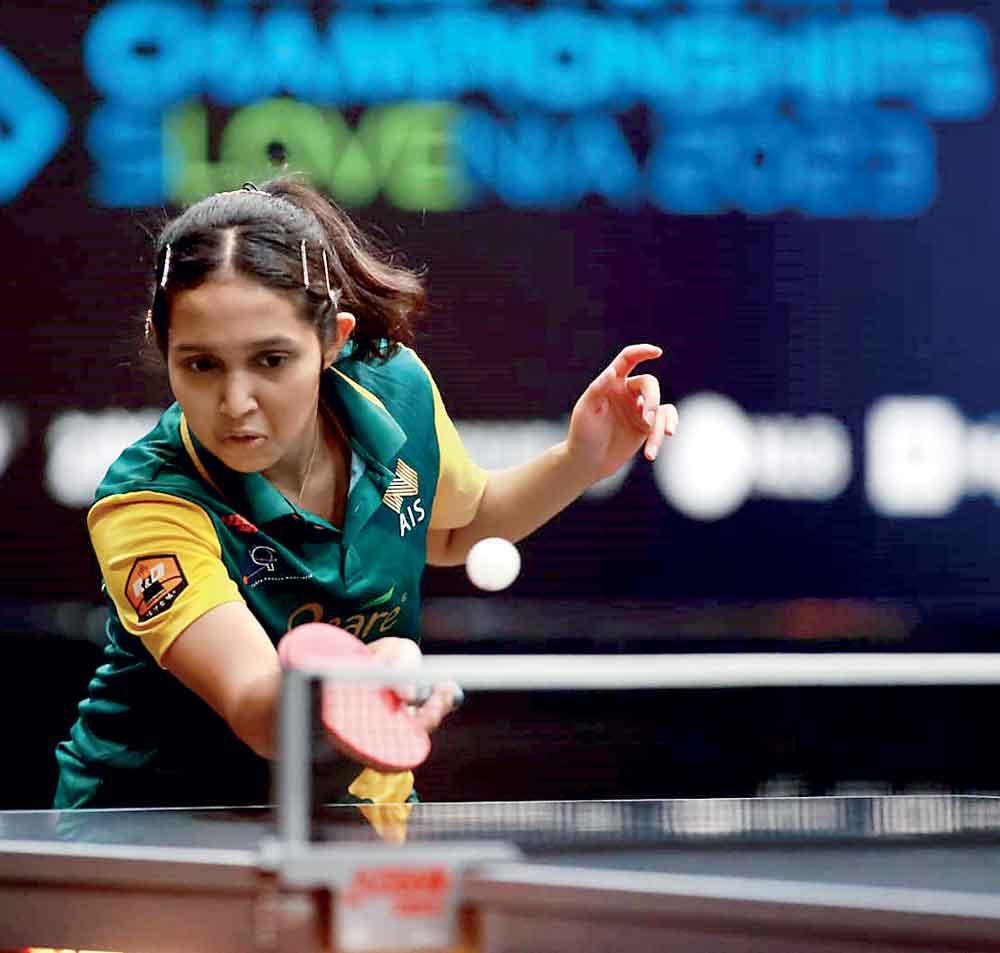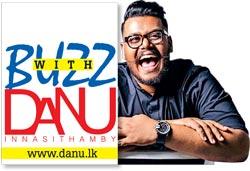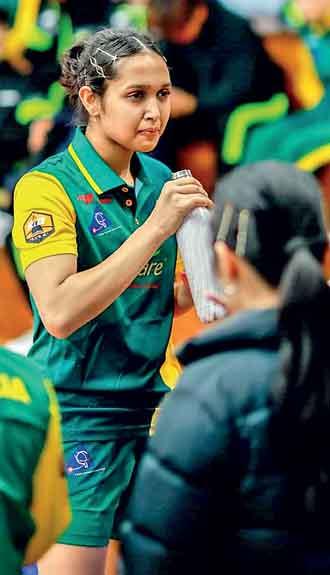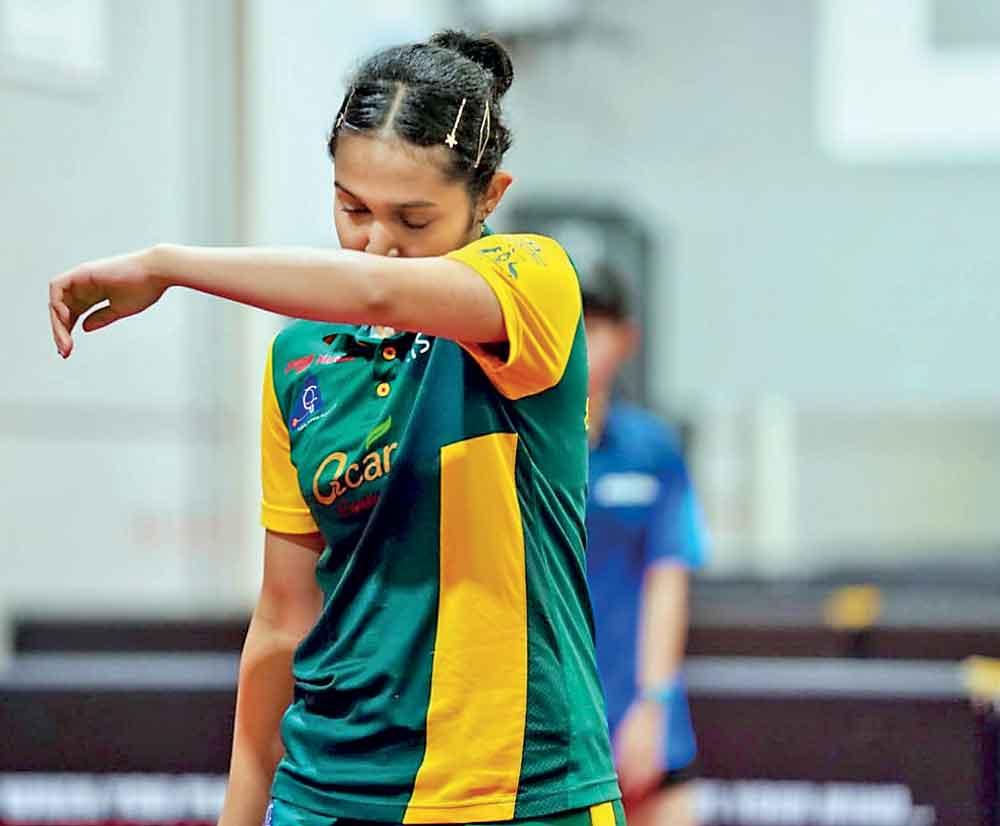06 Nov 2024 - {{hitsCtrl.values.hits}}

Starting my career in Sri Lanka was incredibly formative. Competing in the South Asian Championship and the Asian Table Tennis Championship at such a young age taught me resilience and disciplined practice...
 On the buzz today, we meet Sanaya Buddhadasa – the Sri Lankan table tennis wonder who’s now serving up victories for Team Australia! This ping-pong prodigy has gone from smashing it in the Sri Lankan Under-15s to representing Australia on the world stage, with a trophy cabinet that’s as packed as her passport! She’s not just making waves; she’s spinning, slicing, and dicing her way through tournaments. Recently, she claimed gold in the Under-19 Girls’ Singles at the Oceania Youth Championships. Sanaya’s journey is a mix of high-fives and pure joy, proving she’s the real “ace” down under!
On the buzz today, we meet Sanaya Buddhadasa – the Sri Lankan table tennis wonder who’s now serving up victories for Team Australia! This ping-pong prodigy has gone from smashing it in the Sri Lankan Under-15s to representing Australia on the world stage, with a trophy cabinet that’s as packed as her passport! She’s not just making waves; she’s spinning, slicing, and dicing her way through tournaments. Recently, she claimed gold in the Under-19 Girls’ Singles at the Oceania Youth Championships. Sanaya’s journey is a mix of high-fives and pure joy, proving she’s the real “ace” down under!
 Q:Can you tell us what it feels like to represent Australia at the Table Tennis Youth World Cup?
Q:Can you tell us what it feels like to represent Australia at the Table Tennis Youth World Cup?
Representing Australia at the Youth World Cup is both exciting and humbling. It feels like the culmination of years of hard work and sacrifices. Wearing the Australian colours at such a high level motivates me to push my limits and give back to a country that has offered me so many opportunities. It's a privilege, and I’m grateful every time I step up to compete.
Q:You began your table tennis journey in Sri Lanka and represented the under-15 team at just 12. How did your early experiences in Sri Lanka shape your career?
 Starting my career in Sri Lanka was incredibly formative. Competing in the South Asian Championship and the Asian Table Tennis Championship at such a young age taught me resilience and the importance of disciplined practice. Those early experiences built my confidence and gave me a solid foundation to compete internationally, which has been invaluable as I transitioned to representing Australia.
Starting my career in Sri Lanka was incredibly formative. Competing in the South Asian Championship and the Asian Table Tennis Championship at such a young age taught me resilience and the importance of disciplined practice. Those early experiences built my confidence and gave me a solid foundation to compete internationally, which has been invaluable as I transitioned to representing Australia.
Q:What were some of the biggest challenges you faced when transitioning from Sri Lanka to Australia, both personally and in your sporting journey?
Transitioning from Sri Lanka to Australia came with its challenges. On a personal level, adapting to a new culture and school system while trying to establish myself in a new sports environment was overwhelming at times. In terms of table tennis, the style and pace of training were different, and I had to work hard to adjust. However, those challenges have made me stronger and taught me to stay adaptable.
Q:You’ve mentioned an Olympic dream. What steps are you taking toward achieving that goal, and how has this dream evolved over time?
The Olympics have always been my ultimate goal. Currently, I’m working closely with my coaches on specific techniques and physical conditioning, alongside gaining experience in international competitions. Over time, my focus has shifted from simply qualifying to aiming for a strong finish, hopefully even a podium placement. My dream fuels my dedication, and each step forward brings me closer to making it a reality.
Q:Being ranked number one in Australia in both the under-17 and under-19 categories is a remarkable achievement. What has your training regimen been like to reach this level?
My training routine is quite intense and includes daily practice sessions focusing on both skill refinement and fitness. I also incorporate strength training and mental conditioning, which are essential for high-level performance. Staying disciplined with this regimen has been key to reaching my current rankings, and I’m constantly pushing to improve.
Q:How does it feel to hold ninth place in Australia’s national open rankings, and what does this position mean for your future goals?
Holding ninth place in the national open rankings is rewarding and pushes me to aim even higher. It serves as a milestone in my journey and a reminder of what’s possible. My goal is to keep improving my open ranking, which is an essential step toward preparing for the international stage. Currently I am holding the world ranking 214 in the women's singles category.

Q:Can you describe your current training environment with the Australia Youth Table Tennis Team and how it differs from your earlier training in Sri Lanka?
Training with the Australia Youth Table Tennis Team is a highly structured experience, with access to advanced facilities and sports science resources. In Sri Lanka, the focus was more on core skills and match play, which gave me a strong technical base. Here, we work on both physical and mental aspects of the game, preparing us for every detail of international play.
Q:Who has been your biggest influence or mentors in your table tennis journey, both in Sri Lanka and Australia?
I’ve been lucky to have incredible coaches in both Sri Lanka and Australia. My early private coaches, Mr Nuwan Sampath and Mr Dinesh Deshapriya along with my school coaches Mrs Namal Gunasekara and Mr Vajira Wickramasingha in Sri Lanka shaped my love for the sport and taught me skills and resilience. In Australia, my coaches and teammates continue to inspire me to push harder and aim higher. And, of course, my parents have been a constant source of support and encouragement. My brother is my best training partner who is also highly committed to the game. Without my family I won’t be where I’m today.
Q:How do you balance the demands of training, competitions, and academics at Maribyrnong High School?
Balancing everything is challenging, but Maribyrnong High School has been supportive. With a structured routine and time management, I stay on top of academics while dedicating sufficient time to training. I’ve recently transitioned to Virtual School Victoria (VSV) to complete my high school studies. VSV provides flexible academic support for students like me who are deeply engaged in sports. This setup allows me to manage my time more effectively between training and studies, maintaining a structured routine and prioritizing rest when needed to avoid burnout. The support from VSV has been invaluable in helping me keep up with my academics while I pursue my table tennis goals.
Winning gold at the Oceania Championships this year in both the under-19 and under-21 events was incredibly motivating. It reminded me of how far I’ve come and how much further I can go. Every win fuels my desire to train harder and strive toward my goals
Q:What are your thoughts on competing in three categories (singles, doubles, and mixed doubles) at the Youth World Cup? How are you preparing for this challenge?
Competing in three categories is a demanding but exciting challenge. It requires both physical and mental endurance, as each format has its unique strategies. I’m preparing by focusing on endurance training and practicing in sync with my doubles partners to build chemistry. Competing in multiple formats allows me to showcase versatility and test my adaptability.
Q:How do you feel about being a role model for young Sri Lankan and Australian athletes who might look up to you?
It’s a huge honour to be seen as a role model. I hope my journey encourages young athletes from both Sri Lanka and Australia to pursue their dreams, no matter where they start. I want to inspire them to work hard, embrace challenges, and believe in their potential.
Q:Can you tell us about a memorable moment in your career so far that inspired or motivated you to push harder?
Winning gold at the Oceania Championships this year in both the under-19 and under-21 events was incredibly motivating. It reminded me of how far I’ve come and how much further I can go. Every win fuels my desire to train harder and strive toward my goals.
Q:What is one piece of advice you would give to young athletes, especially those moving countries and navigating different systems?
My advice is to stay focused on your goals, be adaptable, and not fear change. Moving countries is challenging, but it’s also an opportunity for growth. Embrace the journey, stay connected to your support system, and trust yourself.
Q:What do you miss most about Sri Lanka, and how does your Sri Lankan heritage influence you today?
I miss the warmth of my community, friends, and Sri Lankan food! My heritage is a big part of who I am, and it reminds me to stay humble and grounded. It’s something I carry with pride, and it influences my determination and resilience every day.
Q:After the Youth World Cup, what’s next on the horizon for you in terms of tournaments and training?
After the Youth World Cup, I’ll focus on international tournaments to gain more experience and improve my world ranking. My training will continue intensively, targeting specific areas of improvement. Each competition is another step closer to my career goals, and I’m excited for the journey ahead.
25 Dec 2024 51 minute ago
25 Dec 2024 1 hours ago
25 Dec 2024 1 hours ago
25 Dec 2024 2 hours ago
25 Dec 2024 2 hours ago